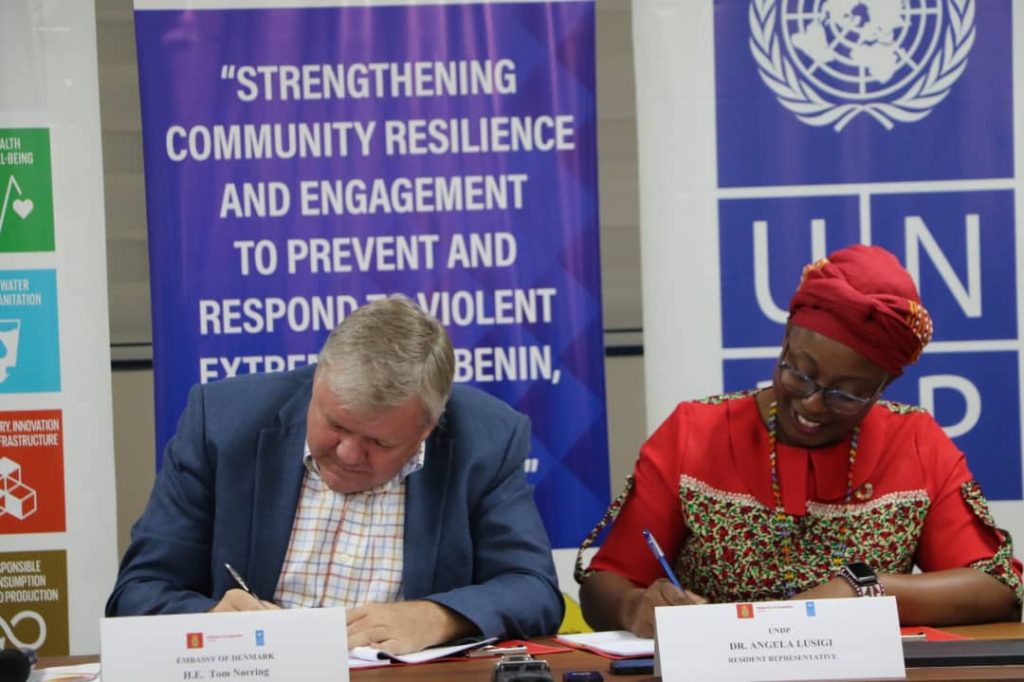By Kodjo Adams
Accra, July 27, GNA – Dr Angela Lusigi, UNDP Resident Representative, has called for a well-coordinated response to fight violent extremism in the West African region.
“We need to move swiftly from analysis, strategy development, and siloed interventions to accelerating a well-coordinated response, as the landscape of violent extremism in West Africa grows increasingly complex,” she said.
She made the call in Accra at the launch of a project on “Strengthening Community Resilience and Engagement to Prevent and Respond to Violent Extremism in Benin, Côte d’Ivoire, Ghana, and Togo”.
The project is in partnership with the UNDP and the Danish government.
The project seeks to prevent and address the immediate localised drivers of radicalization leading to violent extremism in target communities in Benin, Cote d’Ivoire, Ghana, and Togo while providing support to strengthening the ‘Infrastructures for Peace’, namely mechanisms for early warning and early response at the local level.
The project, among others, has sub-objectives of strengthening mechanisms and approaches for early warning and response to violent extremism in target locations and strengthening the socio-
economic resilience of at-risk youth, women, and other vulnerable populations in target locations.
She called for a more integrated and robust sub-regional response that went beyond a securitized approach to address emerging drivers of conflict by building community resilience and strengthening early warning and preventive actions.
That, she stressed, had underscored UNDP’s response in supporting Ghana and its neighbouring countries through its Atlantic Corridor Initiative, which covered Benin, Burkina Faso, Cote d’Ivoire, Ghana, and Togo.
Dr Lusigi said UNDP had supported Ghana to deepen understanding through a groundbreaking study on “Vulnerability to the Threat of Radicalization towards Violent Extremism in Northern Ghana”.
“In partnership with the Ministry of National Security through the National Fusion Centre we developed a vulnerability index and provided real insights into the nexus between environmental, social, and economic vulnerabilities and radicalization,” she said.
Research shows that 32.6 per cent of youth aged between 15-24 are unemployed in Ghana’s Northern Regions.
They are also exposed to localised conflicts, transnational organised crime, cybercrime, and farmer-herder conflicts.
She stated that the rising insecurity and instability in the region were already leading to displacement and contributing to increased multi-dimensional poverty as well as structural and gender-based inequalities.
The Global Terrorism Index shows that the Sahel region is now the epicentre of terrorism.
The Sahel accounted for more terrorism related deaths in 2022 than both South Asia, the Middle East, and North Africa combined.
Deaths in the Sahel constituted 43 per cent of the global total in 2022, compared to just one per cent in 2007.
Mr Tom Nørring, the Ambassador of Denmark in Ghana, said UNDP and Denmark were ready to work with the coastal states to maintain stability and prevent violent extremism.
He said Denmark had been a long-term partner to Ghana, saying Danida had achieved a lot and contributed to significant infrastructure development such as water, roads, and bridges in the North of Ghana.

“As Ghana became a middle-income country, Danish cooperation transitioned from traditional development assistance to technical, commercial, and political cooperation,” he said.
Mr Charles Abani, the UN Resident Coordinator, said the UNDP had 25 agencies and institutions in Ghana focusing on inclusive economic transformation, equitable access to services, and others.
He called for enhanced synergy across the interventions by strengthening border infrastructure, cyber security to respond to violent extremism within the region.
The stakeholders expressed willingness to support the project in preventing terrorist activities in the region.
GNA